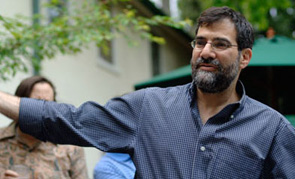Charles Bernstein, anti-anti-intellectual
Charles Bernstein is back from a trip to Israel & Palestine and we are chatting by email this afternoon (typical of us) and I realized that this overview I did of why I like his “Pitch of Poetry” so much adequately gets to what I love about his anti-anti-intellectual Euromodernist never-quite-at-home stance. Here are a few passages from the piece, but please read the whole if you are inclined.
Pitch is of course — perhaps first — the sound of poetry, something Bernstein has thought about (through his sound studies and the Electronic Poetry Center and PennSound) as deeply as anyone this last quarter century. Pitch is register.
But pitch is also the attack or approach, the angle — ideological, yes, and/yet primarily perspectival. This new book Pitch of Poetry makes his best pitch yet for the progressive efficacy of “dialogic critical encounters.” For, truly, you can’t evict an idea. A concept, applied in this book in one major essay and many other references to Occupy, that has its origins, for Bernstein, in European modernist anti-fascism in the 1930s.
And:
In a section of the essay “This Picture Intentionally Left Blank” — the section is titled “Letter from Warsaw” and I found it terribly moving — he describes his and Susan Bee’s and Tracie Morris’s visit to Warsaw and to Lodz. It was a first trip to that haunted landscape. Susan’s mother was born in Jewish prewar Poland, moved to Berlin with her family when she was five, whereupon a diasporic journey began that rendered them multilinguistic survivors (and artists). Bernstein reports that he realized at that moment that he is “someone whose intellectual and cultural
foundations are European,” and by that he now means to refer to dislocation, alienation, and a specifically historical form of radicalism. He found himself standing “on the ground,” as he puts it, “of a great experiment from the decade before I was born, which aimed to expel difference in order to increase harmony through sameness, but the move toward homogenization versus miscegenation is powerful in the Americas as well, since the poetics of the Americas is the continuation of European poetics by other means.” And so — after years of reading and hearing his poetry, criticism, interviews, reviews, collaborations, liberettis, and translations — we arrive at the pitched origin story of a poet’s pitch for difficulty and difference. “The power of American poetry,” he writes, “comes from the mixing of many languages and the resistance to the dominance of any one language, including English, or proper English, anyway. It is the overturning of standard English by second languages and vernacular/dialect speakers that defines American poetry.”




 Al Filreis is Kelly Professor, Faculty Director of the Kelly Writers House, Director of the Center
for Programs in Contemporary Writing, Co-Director of PennSound, and Publisher of Jacket2—all at the University of Pennsylvania. Among his books are Secretaries of the Moon,
Wallace Stevens & the Actual World, Modernism from Left to Right, and Counter-Revolution of the Word: The Conservative Attack on Modern Poetry, 1945-60. His new book is
Al Filreis is Kelly Professor, Faculty Director of the Kelly Writers House, Director of the Center
for Programs in Contemporary Writing, Co-Director of PennSound, and Publisher of Jacket2—all at the University of Pennsylvania. Among his books are Secretaries of the Moon,
Wallace Stevens & the Actual World, Modernism from Left to Right, and Counter-Revolution of the Word: The Conservative Attack on Modern Poetry, 1945-60. His new book is  Founder/Faculty Director,
Founder/Faculty Director, 